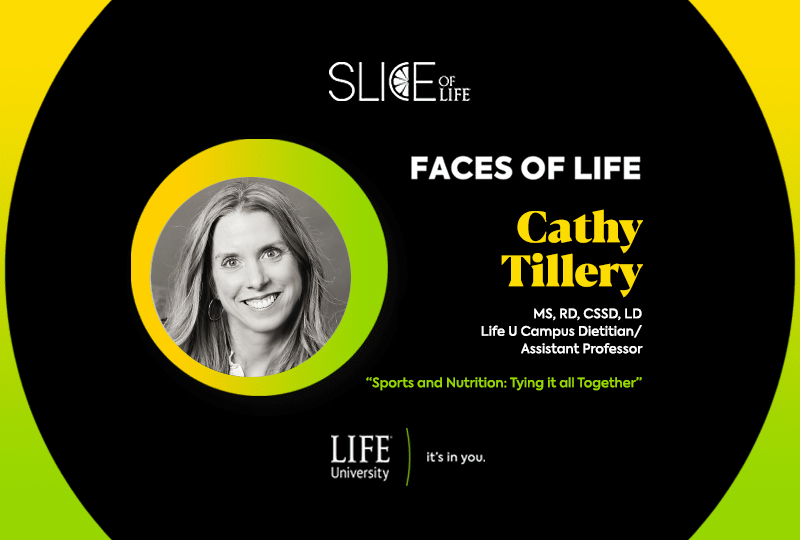Life U Campus Dietitian/Assistant Professor
“Sports and Nutrition: Tying it all Together”
Cathy Tillery, M.S., RD, CSSD, LD, is the Campus Dietitian and an Assistant Professor at Life University (Life U) in the College of Graduate and Undergraduate Studies (CGUS). Tillery’s work is very broad because her job covers everyone on campus from a dietitian standpoint. Her role is to look through her dietitian lens and wear her nutrition educational hat.
“Because so many of our undergraduate students are athletes, I spend a lot of time with Athletics. I’m not under Athletics; I’m still under CGUS, but the majority of the time I spend with Athletics because I am a sports-certified dietitian,” shared Tillery.
Tillery is also an assistant professor in the Nutrition Department and teaches at the undergraduate level. Her classes vary each quarter, depending on the current need in the program. She typically teaches the 101 Nutrition class, which dives into “what nutrition is and introduces students to the different avenues of nutrition, whether it’s going more culinary, more sports nutrition, more the dietetic route as if you wanted to be a dietitian,” explained Tillery. “Occasionally, I will teach, depending on the quarter and scheduling needs, some of the upper-level dietetic classes for our dietetic majors, whether that’s assessment, menu planning and computer analysis, food and culture, life cycle, nutrition. So again, my hands are a little bit in a lot of different areas.”
Before joining Life U, Tillery worked in private practice concentrating on sports and eating disorders. She also worked as a clinician in an outpatient setting at Northside Hospital.
Tillery grew up in Marietta and is married with five children. They are older, and she and her husband are on the verge of becoming empty nesters.
Tillery has a master’s in exercise physiology along with a bachelor’s in nutrition. She realized early on that she wanted to help athletes be their best through nutrition, and as a registered dietitian, she is able to work with Life U athletes on a one-on-one basis, helping them maximize their performance and test their body composition.
“We don’t really look at weight and body composition as a measure, only as it measures to performance. So how does your body composition, your lean body mass, your fat mass, how does that help you in your performance? And then I do nutrition education with the teams, depending on if they need it,” said Tillery.
Part of her job is to work with the athletic teams to help them plan ahead nutritionally when they travel. Tillery has also helped set up fuel stations on campus for the student-athletes a couple of times a week. She has been doing this for a little over two years every Tuesday and Thursday in in the Center for Athletics and Sport Health Science (SHS) from 8:30-11:30 a.m., as well as the Running Eagles Performance (REP) Center (the new building by Lupo Family Field) from 1:00-3:00 p.m.
“The purpose behind it is one, to fuel them, but also I’m at the fuel station to answer those questions so that we can really connect the food with […] this food is a good protein for post-workout; here’s some good items for hydration,” explained Tillery. “It gives me time with 650-plus athletes […] to get to know me; they get to see my face. If they have a quick question for me that they don’t want to sit down for 30 minutes to an hour, they can have those conversations with me instead of trying to find me in my office.”As to why a potential student should choose studying at Life U, Tillery says that we offer something very different from other universities. Because our university is smaller, our class sizes are smaller with a very personalized and individual approach. Being able to give a one-on-one approach offers such an enormous amount of time with our professors, who offer so many specialties.
“I think when it comes to nutrition and exercise and fitness, so many people get discouraged because of all the information out there. A lot of people want a quicker fix, and I think they need to be a little bit more forgiving of themselves and realize that, when we’re trying to improve our health, whatever that means to anyone, it’s a slow and gradual process, and consistency is the key. And again, to be a little bit more forgiving if we’re not perfect. We’re never going to be perfect in our exercise or our nutrition plans, but day in and the day out, the consistency is where we make the most gains to get to our goals.”
Those interested in learning more information on Life U’s nutrition program can click here.


Social Media